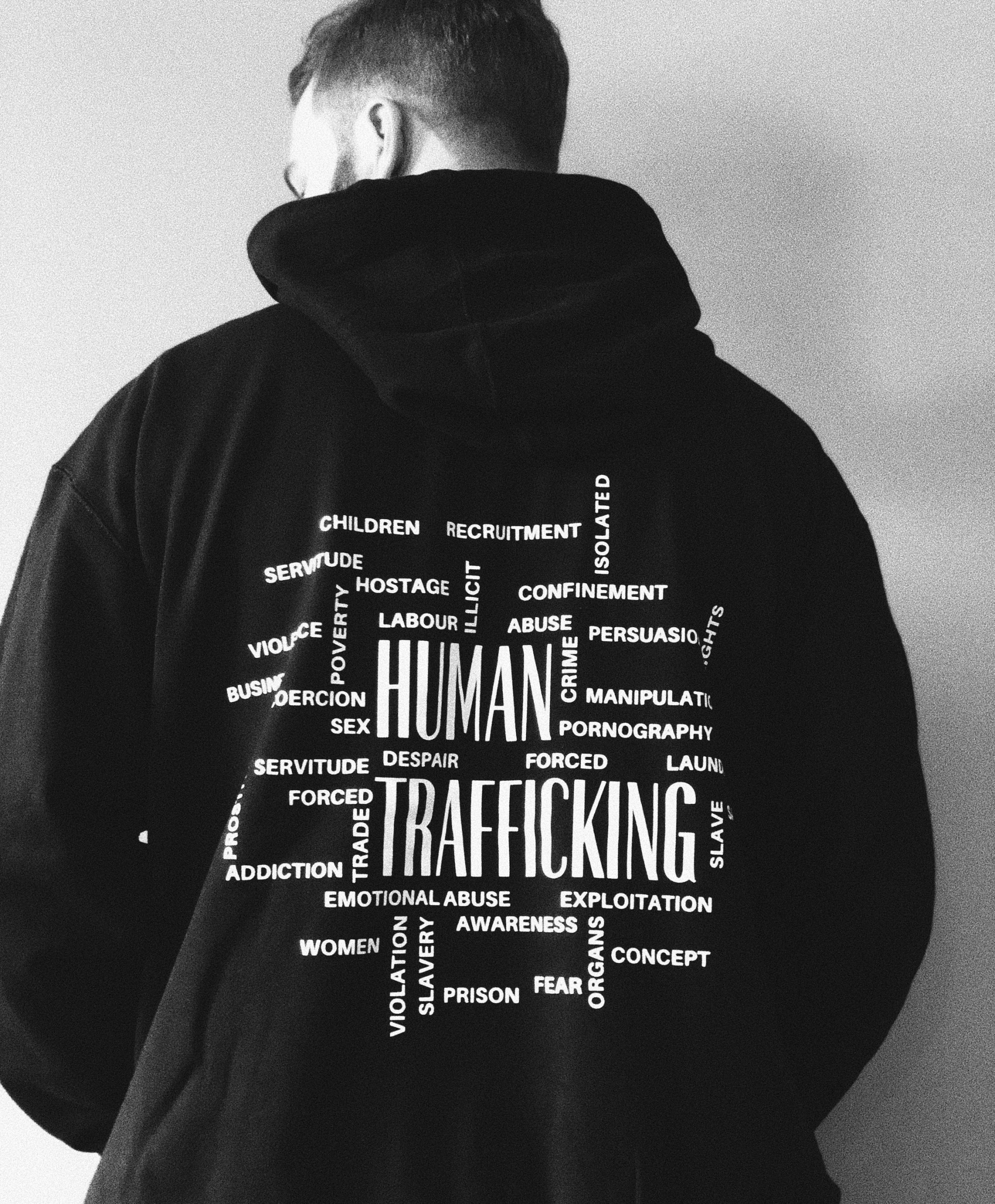What is Human Trafficking?
Human Trafficking is a type of act that involves the use of force, fraud, or coercion, as a means to obtain a form of labour or commercial sex act. Traffickers lure victims into trafficking situations through the use of violence, manipulation, romantic relationships, and false promises involving well-paying jobs1.
At its core, human trafficking involves taking away an individual’s freedom for profit. While force, fraud, or coercion must be present for it to be defined as human trafficking with adults, for minors, these characteristics are not necessary if commercial sex is occurring2.
Types of Human Trafficking
Sex Trafficking
Sex trafficking is the recruitment, harbouring, transportation, provision, or obtaining of a person for the purpose of commercial sexual acts. These sexual acts are induced by force, fraud, or coercion, or in which the person induced is under 183.
Labour Trafficking
Labour trafficking, also referred to as forced labour, occurs when individuals are compelled, against their will, to provide work or service through the use of force, fraud, or coercion4

Reasons People Become Targets
It is important to acknowledge that anyone can be a victim of human trafficking. However, certain populations are more vulnerable than others. There are also specific circumstances that may make an individual an easier target for traffickers. Traffickers often identify vulnerabilities in their victims and use them to create a dependency.
Here are some of the situations and populations that are at greater risk of human trafficking:
- Those with recent migration or relocation
- Individuals with substance abuse
- Those involved in the child welfare system
- Runaways or homeless youth
- People dealing with psychological or emotional vulnerability
- Individuals going through economic hardship
- Those who lack a social support system
- Victims of natural disasters5.
The Action, Means, Purpose (AMP) Model is an effective tool to utilize when identifying survivors of sex trafficking.
Myths and Misconceptions
- MYTH: Human trafficking only occurs in third-world countries, specifically in areas with poverty: Fact: human trafficking can occur anywhere – in cities, suburbs, and rural areas. It occurs in every country, regardless of economic status. Additionally, victims can be of any age, race, gender, or nationality, and come from any socioeconomic background.
- MYTH: Human trafficking is sex trafficking. Fact: sex trafficking is a subtype of human trafficking, but it is not the only type of human trafficking. Forced labour is another form of human trafficking; both involve exploiting other people.
- MYTH: Human smuggling and human trafficking are interchangeable terms. Fact: human trafficking is based upon the exploitation of an individual and does not require movement across borders. Smuggling specifies the movement of a person across a country’s border with the individual’s consent, which violates immigration laws. These are two extremely different acts, but human smuggling can turn into human trafficking if the smuggler uses force or coercion in order to hold someone against their will and force them into labour or sexual acts.
- MYTH: Human trafficking victims seek help if out in public. Fact: victims may be fearful of coming forward. They may be afraid of their captors, dealing with threats from traffickers that would impact themselves or their families, or lacking resources to turn to outside of their trafficker. The individual may not recognize they are being trafficked, might be in fear of law enforcement, or may be unable to communicate with others due to language barriers6.
Concerned Someone May Be a Human Trafficking Victim?
Here is a list of questions to ask if you have concerns someone is being trafficked:
- Does this person have ties to family, friends, or a community?
- If children are involved, are they still attending school?
- Is the person acting differently or have they seemed to have changed their personality or behaviour?
- Do you have reason to believe a juvenile is involved in commercial sexual acts?
- Are they showing disorientation, confusion, or signs of mental or physical abuse?
- Do they appear to be fearful, timid, or submissive?
- Do you have reason to believe the person is being starved, dehydrated, lacking sleep, or being refused the right to seek medical care?
- Is the individual often around someone they seem submissive towards? Does the other person seem to be in control of the people whom they see and talk to?
- Has the person’s living conditions deteriorated or changed drastically, potentially even lacking a stable living situation?
- Does the person seem to lack personal possessions?
- Is the person welcome to leave their living situation when they want? Do they have freedom of movement?
While these are all factors that should be taken into consideration, they do not necessarily indicate someone who is being human trafficked. Likewise, the absence of these indicators does not necessarily prove the lack of human trafficking7.
Utilizing Hotlines for Support
If you have reason to believe that someone you know is a victim of human trafficking, or if you have reason to think you know individuals or businesses involved in human trafficking, contact the National Human Trafficking Hotline.
- Call: 1-888-373-7888
- Text: 233833
- Online Chat
The hotline offers the following services:
- Crisis assistance to victims of human trafficking
- Takes reports of human trafficking tips
- Connects individuals to anti-trafficking services in their area
- Helps callers to access general resources and information
- Assists individuals in getting involved in the community8.
Tips to Protect Yourself
Job Offers
Keep these things in mind regarding job offers. These can be warning signs to look out for:
- If it sounds too good to be true, it probably is. Be cautious of offers for jobs that typically are difficult to get or would require locating to a remote area, such as foreign cities or far away states.
- Wages and job descriptions do not match, such as a high salary with a low-level job.
- The employer neglects to ask for a resume, job experience, etc.
- Part of the application process involves a photo of you.
- The employer is asking you to lie about the job or keep it a secret from others.
- The questions during the interview are personal questions and irrelevant to the possible job.
Relationships
These are all questionable behaviours for any relationship, but can especially be a red flag in regards to possible human trafficking situations:
- Controlling behaviours, such as demanding to know your location at all times, requiring you to ask permission to leave the home or socialize, limiting communication with loved ones, etc.
- Makes threats to harm you or others if you refuse to abide by their ‘rules’.
- Refuses to let you maintain ownership over personal documents, money, identification cards, etc.
- Requires you to ask them for money, rather than allowing you to have access to finances of your own.
- Not allowed to have access to your own paychecks and/or make you work at a job that they have set you up with.
- Forces you to perform sexual acts on yourself or others for money, drugs, or items of value.
Online Safety
These are tips to be cautious with regarding social media and online presence. Take these into account so you don’t potentially open yourself up to online predators:
- Be cautious about sharing personal information with others online, such as your home address, place of employment, the school you go to, or other details that could allow strangers to find your location.
- Be vigilant about keeping privacy settings secure on social media and only add people who you know personally.
- Only share content, pictures, and videos that you are comfortable with family, future employers, and significant others seeing, as the internet can be forever.
- If you do meet someone online and plan to meet them in person, make sure it is in a public setting. Make sure that people you love know where you are and make sure that you do check in’s with them before and after the meeting.
- If you find out that someone online is lying about their identity, make sure to inform authorities or report it to the Human Trafficking Hotline.
- Above all else, trust your instincts! If your gut is telling you something is wrong or someone is not who they are saying, there may be a reason for these reactions – it is always better to be overly cautious 9.
Seeking Treatment
If you are looking for a therapist specializing in human trafficking and trauma related to this topic, our therapists through Online-Therapy.com provide Cognitive Behavioral Therapy (CBT)
We have a variety of therapists who would love to help you with mental health concerns. Our platform offers a complete online therapy toolbox for individuals and couples! Our site has multiple options, which involve time with a personal therapist who can support you throughout your journey. If this is something you have an interest in, we would love to hear from you.




Leave A Comment